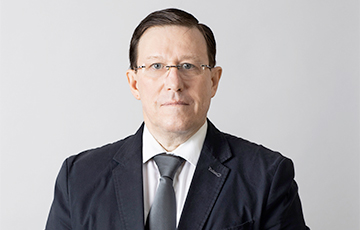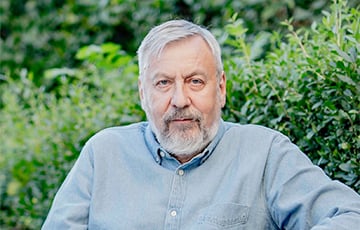Arkady Moshes On Border Situation: Lukashenka Is Itching To Get Involved
26- 13.06.2024, 14:10
- 27,666

The Belarusian ruler wants to show how many problems he can create for his neighbors.
Polish President Andrzej Duda said that 50 attacks on Polish soldiers on the Belarusian border by illegal immigrants have been recorded recently. Yesterday, on June 13, the funeral of Polish soldier Mateusz Sitek, who was killed by an illegal immigrant on the border with Belarus, took place.
Why did the escalation start now? Charter97.org asked this question to Arkady Moshes, director of the research program on Russia, the EU's Eastern Neighborhood and Eurasia at the Finnish Institute of International Affairs:
— I don't have a clear answer to this difficult question. There are two ways to think about it. It's possible that there is nothing; it's just that people who are on the Belarusian side of the border at some point began to lose patience, and tried some kind of forceful actions. We have seen similar actions, for example, in the Spanish enclaves in North Africa, in Ceuta, for example, when people try to achieve their goal by force, based on the fact that as soon as they break through, they will be spoken to differently. So, in principle, it could have been an unplanned nervous and psychological breakdown.
But, of course, we can also reason differently. It is quite easy to imagine that people in Moscow and Minsk, based on their understanding of how a hybrid war is waged and what role migrants play in this, decided to add fuel to the fire and began to organize provocations. I will not confirm this, but I cannot rule it out either.
— The Polish side notes that illegal immigrants have Russian visas in their passports, which distinguishes these attacks from what happened in 2021, when people were detained at the border mainly with Belarusian visas. What is Russia's role in this story?
— If Poland has a large enough base to make such statements (and I do not doubt it), this, first of all, means that Russia is large, and it is easier for it to organize the relevant processes. It has more people, a more developed infrastructure of foreign missions, the same consulates in the capitals of the Middle Eastern and African states, from which the main flow of potential migrants comes.
But, in terms of responding to the situation, there is no difference. It does not matter who issued the visa, what is important is that the migrants ended up in Belarus. Russian visas do not mean that all this was completely invented exclusively by Moscow, alone.
I fully admit that Aliaksandr Lukashenka gave the go-ahead for this, and maybe even bargained for something in return. Technically, it is certainly easier for Russia to organize the flow of migrants, but, nevertheless, this is exactly the question to which Lukashenka, if he wanted, could answer negatively. He has enough physical force resources — enough for mass political repressions against Belarusian citizens, enough police forces to prevent the flow of people with visas issued by Russian consular offices. If he does not do this, it means that this has been somehow discussed and personally sanctioned by him. How, in exchange for what — that’s another conversation, I don’t know this.
So I wouldn’t blame Moscow for everything. Rather, we are talking about an agreed decision. And not necessarily imposed on Lukashenka. I think his hands are also itching to show Belarus’ Western neighbors how many problems he can create for them if they don’t take him into account.
— Some Belarusian experts offer the following answer: Poland closes the transit of goods from Belarus, which China uses for export to Europe, which will lead to Beijing putting pressure on Lukashenka and Putin to stop these attacks. How realistic is this tool? Or is it something from the realm of fantasy?
— China has the ability to provide transit, bypassing the territory of Russia and the territory of Belarus. Therefore, I think it is unlikely. It is easier for the Chinese to reorient transit than to put pressure on someone. And in dynamics, I am not at all sure that Chinese transit still depends so much on the Russian-Belarusian route. There are many other options. I do not think that China will interfere here.
— At the beginning of our conversation, you said that people began to lose patience and try forceful options. Should we expect escalation? A simple example: illegals already have bladed weapons, but what if firearms suddenly appear?
— Escalation cannot be ruled out, but if firearms appear, then I do not see any advantages for Minsk and personally for Lukashenka in this at all. This would simply drive the regime even further into the status of a no-no. Because then only two explanations would be possible.
First: Belarus is a so-called “failed state”. Because if people with firearms (no matter who they are aimed at or how they were obtained) can freely roam its territory, especially in the border zone, and it cannot stop this, then it cannot be called anything else. Second: Belarus is in on it, and Minsk is organizing all this. But then the country is a sponsor of international terrorism. Choose what is best for its reputation.
Not to mention that these people with weapons can also walk through nearby settlements. “Go on an excursion”, as Lukashenka said on another occasion. It is worth remembering that many of these young people in their countries of origin have learned to perceive violence completely differently than residents of Europe, Belarus or Russia.
Therefore, I do not expect people armed with firearms to appear in the border area in the near future. However, the very fact that some people are sitting in the border zone allegedly without permission, in an unclear status, on a visa issued by another state, but with a bladed weapon, does not characterize the state of Belarusian statehood and law enforcement in a very flattering way.
I would also like to emphasize one important thing — I do not consider what is happening a crisis. A crisis is a situation when problems accumulate, and the relevant authorities (in this case, Polish and Lithuanian) cannot decide what to do about it.
In this case, everything looks different. Even in 2021, there was no crisis. As soon as the decision was made not to let migrants in and not to pay attention to criticism from people who are “for everything good and against everything bad,” but to strengthen the border with human and technical resources, the crisis immediately deflated. Because the danger of mass breakthroughs disappeared.
I think that somewhere around 2021, and somewhere, like in Finland, since 2015, society and, accordingly, law enforcement agencies have come a long way from perceiving migrants at the border as a humanitarian problem and a reason for discussion to seeing this phenomenon as part of a hybrid war. This shift in the minds of most ordinary people and a significant part of politicians is obvious. Therefore, the task now is to separate people who have the right to asylum from those who do not have such grounds. The arrival of the latter will be increasingly effectively minimized.
With a closed border, the problem will definitely not grow to the level of a crisis. Again, Finland has been living with a completely closed Russian border since November 30 last year. Completely. This is the only country in Europe that took such a step, and without hesitation. This also hit Finnish citizens who, for humanitarian or other reasons, needed to travel to Russia, but the issue of illegal migration was removed from the current agenda. Yes, the problem as such has not been solved, because as soon as the border opens, attempts to break through it will resume. But in the daily flow of events, it is not a big headache. And while the border is closed, the legislation changes, and as a result, law enforcement agencies should receive an effective tool for dealing with the problem.
From my point of view, there is no crisis on the Polish-Belarusian border either. Yes, of course, when a serviceman dies, it is an emergency. This should not be allowed, and most importantly, no one should get away with it. And I think that the Polish leadership is able to make the necessary decisions in this regard, because it is ready to make them, and society is ready.
Even though there is a split on many other issues between the liberal and more conservative wings of the Polish political spectrum, the issue of the need to secure the border is actually a matter of national consensus. Both the previous government and the current one are doing the same things, this is very important. This is an indicator that the problem will be prevented from escalating into a crisis.











